Related Research Articles

William Thomas Tutte was an English and Canadian code breaker and mathematician. During the Second World War, he made a brilliant and fundamental advance in cryptanalysis of the Lorenz cipher, a major Nazi German cipher system which was used for top-secret communications within the Wehrmacht High Command. The high-level, strategic nature of the intelligence obtained from Tutte's crucial breakthrough, in the bulk decrypting of Lorenz-enciphered messages specifically, contributed greatly, and perhaps even decisively, to the defeat of Nazi Germany. He also had a number of significant mathematical accomplishments, including foundation work in the fields of graph theory and matroid theory.
Gordon B. Agnew is a Canadian engineering professor at the University of Waterloo. Agnew's primary research interests are in the fields of encryption and data security.
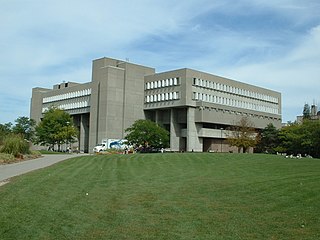
The Faculty of Mathematics is one of six faculties of the University of Waterloo in Waterloo, Ontario, offering more than 500 courses in mathematics, statistics and computer science. The faculty also houses the David R. Cheriton School of Computer Science, formerly the faculty's computer science department. There are more than 31,000 alumni.
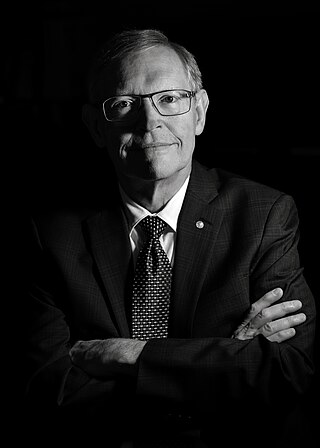
William Esco Moerner, also known as W. E. Moerner, is an American physical chemist and chemical physicist with current work in the biophysics and imaging of single molecules. He is credited with achieving the first optical detection and spectroscopy of a single molecule in condensed phases, along with his postdoc, Lothar Kador. Optical study of single molecules has subsequently become a widely used single-molecule experiment in chemistry, physics and biology. In 2014, he was awarded the Nobel Prize in Chemistry.

Václav (Vašek) Chvátal is a Professor Emeritus in the Department of Computer Science and Software Engineering at Concordia University in Montreal, Quebec, Canada, and a visiting professor at Charles University in Prague. He has published extensively on topics in graph theory, combinatorics, and combinatorial optimization.

Harm Peter Hofstee is a Dutch physicist and computer scientist who currently is a distinguished research staff member at IBM Austin, USA, and a part-time professor in Big Data Systems at Delft University of Technology, Netherlands.

Margaret H. Wright is an American computer scientist and mathematician. She is a Silver Professor of Computer Science and former Chair of the Computer Science department at Courant Institute of Mathematical Sciences, New York University, with research interests in optimization, linear algebra, and scientific computing. She was elected to the National Academy of Engineering in 1997 for development of numerical optimization algorithms and for leadership in the applied mathematics community. She was elected to the National Academy of Sciences in 2005. She was the first woman to serve as President of the Society for Industrial and Applied Mathematics.
Jim Geelen is a professor at the Department of Combinatorics and Optimization in the faculty of mathematics at the University of Waterloo, where he holds the Canada Research Chair in Combinatorial optimization. He is known for his work on Matroid theory and the extension of the Graph Minors Project to representable matroids. In 2003, he won the Fulkerson Prize with his co-authors A. M. H. Gerards, and A. Kapoor for their research on Rota's excluded minors conjecture. In 2006, he won the Coxeter–James Prize presented by the Canadian Mathematical Society.

Oscar Marius Nierstrasz is a professor at the Computer Science Institute (IAM) at the University of Berne, and a specialist in software engineering and programming languages. He is active in the field of programming languages and mechanisms to support the flexible composition of high-level, component-based abstractions, tools and environments to support the understanding, analysis and transformation of software systems to more flexible, component-based designs, secure software engineering, and requirement engineering to support stakeholders and developers to have moldable and clear requirements. He has led the Software Composition Group at the University of Berne since 1994 to date.
Michele Mosca is co-founder and deputy director of the Institute for Quantum Computing at the University of Waterloo, researcher and founding member of the Perimeter Institute for Theoretical Physics, and professor of mathematics in the department of Combinatorics & Optimization at the University of Waterloo. He has held a Tier 2 Canada Research Chair in Quantum Computation since January 2002, and has been a scholar for the Canadian Institute for Advanced Research since September 2003. Mosca's principal research interests concern the design of quantum algorithms, but he is also known for his early work on NMR quantum computation together with Jonathan A. Jones.
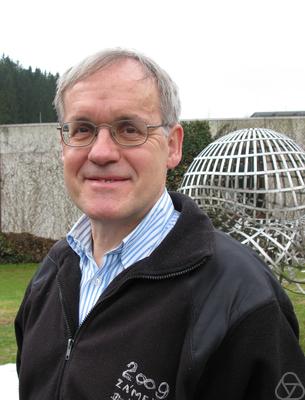
Alexander (Lex) Schrijver is a Dutch mathematician and computer scientist, a professor of discrete mathematics and optimization at the University of Amsterdam and a fellow at the Centrum Wiskunde & Informatica in Amsterdam. Since 1993 he has been co-editor in chief of the journal Combinatorica.
Nicholas Charles Wormald is an Australian mathematician and professor of mathematics at Monash University. He specializes in probabilistic combinatorics, graph theory, graph algorithms, Steiner trees, web graphs, mine optimization, and other areas in combinatorics.
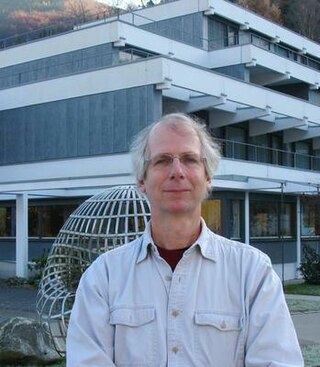
William John Cook is an American operations researcher and mathematician, and Professor of Combinatorics and Optimization at the University of Waterloo.
Ying Zou is a Canadian computer scientist. She is a professor in the Department of Electrical and Computer Engineering at Queen's University and a Canada Research Chair in Software Evolution. She was awarded the IBM CAS Research Faculty Fellow of the Year in 2014 and the IBM Faculty Award in 2007 and 2008.

Raouf Boutaba is an Algerian Canadian computer scientist. His research interests are in resource, network and service management in wired and wireless networked systems. His work focuses on network virtualization, network softwarization, cloud computing, and network security.
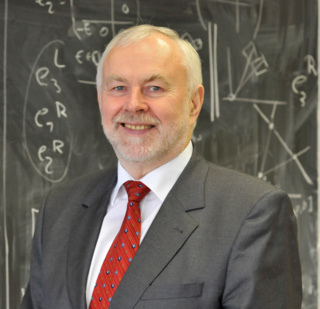
Martin Grötschel is a German mathematician known for his research on combinatorial optimization, polyhedral combinatorics, and operations research. From 1991 to 2012 he was Vice President of the Zuse Institute Berlin (ZIB) and served from 2012 to 2015 as ZIB's President. From 2015 to 2020 he was President of the Berlin-Brandenburg Academy of Sciences and Humanities (BBAW).
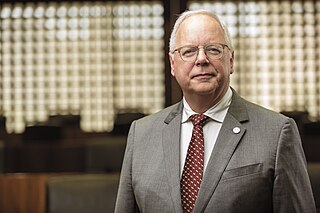
Michael Alan Trick is an operations researcher who studies combinatorial optimization, and is known for his work on sports scheduling, transportation scheduling, and social choice. He is the Harry B. and James H. Higgins Professor of Operations Research in the Tepper School of Business at Carnegie Mellon University (CMU), and dean of Carnegie Mellon University in Qatar.
Jorge Nocedal is an applied mathematician, computer scientist and the Walter P. Murphy professor at Northwestern University who in 2017 received the John Von Neumann Theory Prize. He was elected a member of the National Academy of Engineering in 2020.
Thomas F. Coleman is a Canadian mathematician and computer scientist who is a Professor in the Department of Combinatorics and Optimization at the University of Waterloo, where he holds the Ophelia Lazaridis University Research Chair. In addition, Coleman is the director of WatRISQ, an institute composed of quantitative and computational finance researchers spanning several Faculties at the University of Waterloo.
Ian P. Goulden is a Canadian and British mathematician. He works as a professor at the University of Waterloo in the department of Combinatorics and Optimization. He obtained his PhD from the University of Waterloo in 1979 under the supervision of David M. Jackson. His PhD thesis was titled Combinatorial Decompositions in the Theory of Algebraic Enumeration. Goulden is well known for his contributions in enumerative combinatorics such as the Goulden-Jackson cluster method.
References
- 1 2 3 4 William Pulleyblank, Ph.D., USMA Network Science Center, retrieved 2014-12-08.
- ↑ William R. Pulleyblank at the Mathematics Genealogy Project
- 1 2 "A Talk with the Brain behind Blue Gene", BusinessWeek , November 6, 2001, archived from the original on December 11, 2014.
- 1 2 3 4 William Pulleyblank, Waterloo Combinatorics & Optimization, retrieved 2014-12-10.
- ↑ William Pulleyblank, Council of Canadian Academies, retrieved 2014-12-09.
- ↑ Anbil, Ranga; Forrest, John J.; Pulleyblank, William R. (1998). "Column generation and the airline crew pairing problem". Doc. Math. (Bielefeld) Extra Vol. ICM Berlin, 1998, vol. III. pp. 677–686.
- ↑ Dr. William Robert Pulleyblank, National Academy of Engineering member directory, retrieved 2014-12-09.